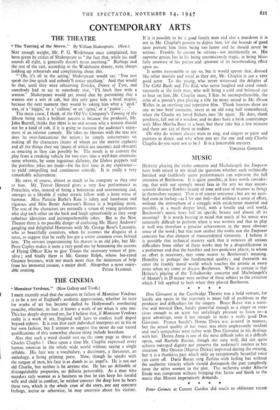THE CINEMA
I HAVE recently read that the success or failure of Monsieur Verdoux is to be a test of England's aesthetic appreciation, whether its taste for works of art has become dulled by Hollywood's everlasting pastiche, whether, in fact, it knows a work of art when it sees one. This has deeply depressed me, for I believe that, if Monsieur Verdoux really is a work of art, England will have to confess itself doped beyond redress. It is true that each individual interprets art in his or her own fashion, but I venture to suggest that never do our varied qualifications of this somewhat elusive thing include boredom.
Alas that such a word should rest on the same page as those of Charles Chaplin ! Once upon a time Mr. Chaplin expressed every human emotion in the whole wide world without saying a single syllable. His face was a vocabulary, a dictionary, a thesaurus, an anthology, a living printing press. Now, though he speaks with the tongue of men, his face is as dumb as an angel's. He is not our old Charlie, but neither is he anyone else. He has no definable or distinguishable properties, no definite personality. As a man who murders rich women as a business so that he can keep his invalid wife and child in comfort, he neither conveys the deep love he bears these two, which is the whole crux of the story, nor any concrete feelings, jocose or otherwise, he may entertain about his victims. If it is possible to be a good family man and also a murderer it is not in Mr. Chaplin's powers to depict him, for the bounds of good taste prevent him from being too funny and he should never be serious. Frankly, he cannot be serious—not intentionally so. His supreme genius lies in his being unconsciously tragic, in being bliss- fully unaware of his pathos and ignorant of its heartbreaking effect upon us.
It seems treasonable to say so, but it would appear that, dressed like other mortals and vocal as they are, Mr. Chaplin is not a very good actor. To the young, who never witnessed the delights of The Gold Rush and The Kid, who never laughed and cried simul- taneously at the little man, who will bring a cold and balanced eye to bear on him, Mr. Chaplin must, I fear, be incomprehensible, the echo of a parent's past playing a role far more suited to Mr. Orson Welles in an overlong and repetitive film. Thank heavens there are one or two brief moments, sweet as an old song half remembered, when the Charlie we loved flickers into life again. He does, thank goodness, fall out of a window, and he does have a brisk contretemps with Miss Martha Raye in a boat, but these take but a few minutes and there are 125 of them to endure.
Oh why do writers always want to sing, and singers to paint and painters to dance, and why when you are the one and only Charlie Chaplin do you want not to be ? It is a lamentable mystery.
VIRGINIA GRAHAM.






























 Previous page
Previous page